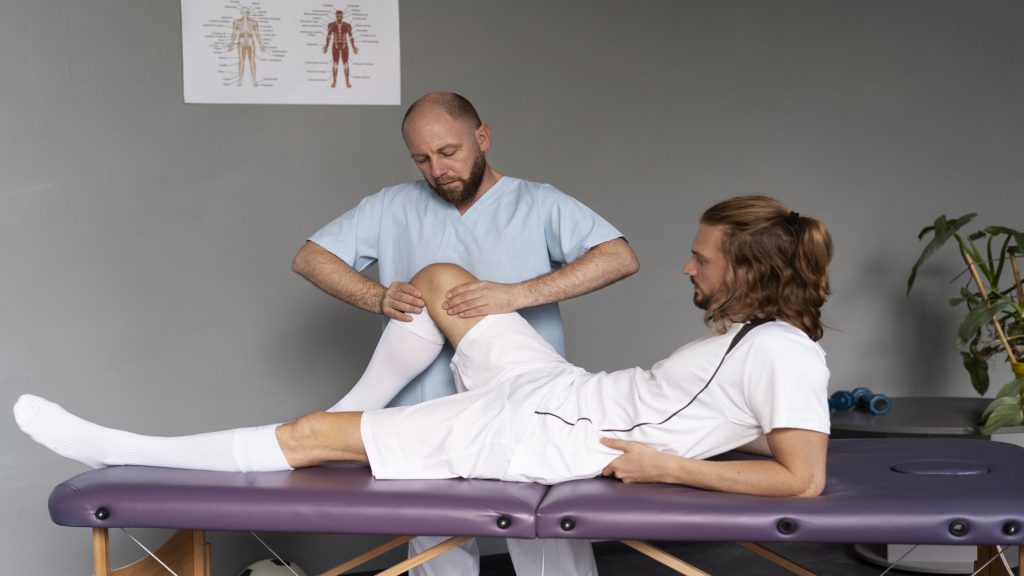If you grapple with sports injuries, the path to recovery might lead you to the transformative realm of physical therapy. Injuries can be a frustrating setback, whether you’re an athlete pushing your limits or someone who enjoys an active lifestyle. However, adopting physical therapy as a solution holds the promise of alleviating discomfort and fostering long-term well-being.
In this blog, we delve into the pivotal role of physical therapy in rehabilitation, exploring how it offers hope for those facing the challenges posed by sports-related injuries.
Signs that you have sports injuries
Sports injuries can manifest in various ways, and the signs can differ based on the type and severity of the injury. Here are some general symptoms that may indicate you have a sports injury:
- Pain
- Swelling
- Bruising
- Limited Range of Motion
- Weakness
- Instability
- Numbness or Tingling
- Difficulty Putting Weight on the Injured Area
- Heat or Warmth
- Visible Deformity
If you suspect you have a sports injury, it’s advisable to consult with a healthcare professional for a proper diagnosis and treatment plan.
What is Physical Therapy?
Physical therapy is a healthcare profession focused on improving and restoring the physical function and mobility of individuals affected by injuries, illnesses, or disabilities. It employs a holistic approach to address various conditions, encompassing musculoskeletal, neurological, cardiovascular, and respiratory issues. Physical therapists utilize different techniques, exercises, and manual therapies to enhance flexibility, strength, coordination, and balance.
The goal is alleviating pain, promoting recovery, and optimizing overall well-being. Through personalized assessments and treatment plans, physical therapists work collaboratively with patients to enhance their quality of life, enabling them to regain independence and engage in daily activities with improved functionality. Additionally, physical therapy often plays a crucial role in preventive care, educating individuals on proper body mechanics and exercises to minimize the risk of future injuries.
Physical Therapy for sports injuries
Physical Therapy is crucial in rehabilitating and recovering individuals experiencing sports injuries. This specialized branch of healthcare focuses on restoring mobility, strength, and functionality to injured athletes, helping them return to their pre-injury performance levels. Physical therapists employ various techniques, including targeted exercises, manual Therapy, and modalities like heat or ice, to alleviate pain, reduce inflammation, and enhance healing.
Additionally, they educate athletes on proper body mechanics and injury prevention strategies to minimize the risk of future injuries. Tailoring treatment plans to individual needs, physical therapists collaborate with athletes to optimize recovery and promote long-term well-being, ensuring a safe and effective return to the demands of their respective sports.
Benefits of Physical Therapy for sport injuries
Pain Reduction and Management
Physical Therapy plays a crucial role in alleviating pain associated with sports injuries. Through targeted exercises, manual Therapy, and modalities such as ultrasound or electrical stimulation, physical therapists can help reduce inflammation, muscle spasms, and joint pain. This enhances the athlete’s comfort and facilitates a quicker and more effective recovery.
Restoration of Function and Mobility
Sports injuries often lead to a loss of function and restricted mobility. Physical therapists design tailored rehabilitation programs to restore range of motion, flexibility, and strength. By addressing specific muscle imbalances and weaknesses, they aim to bring the athlete back to their pre-injury level of performance, ensuring optimal function and mobility for a safe return to sports activities.
Prevention of Secondary Complications
Physical Therapy focuses on the immediate injury and addresses potential secondary complications during recovery. Therapists guide athletes in maintaining overall fitness, preventing muscle atrophy, and ensuring proper biomechanics. Doing so minimizes the risk of developing compensatory movements or new injuries, promoting a more sustainable and lasting recovery.
Individualized Treatment Plans
Each athlete and injury is unique, and physical therapists recognize the importance of personalized treatment plans. Through thorough assessments, therapists identify specific weaknesses, imbalances, and areas of concern. They then create customized rehabilitation programs that target the athlete’s individual needs, optimizing the effectiveness of the treatment and tailoring it to the demands of the particular sport.
Education and Empowerment
Physical Therapy empowers athletes with knowledge about their bodies and the mechanisms of injury. Therapists educate athletes on proper biomechanics, ergonomics, and injury prevention techniques. By understanding the factors contributing to their injury, athletes are better equipped to make informed decisions about their training and performance. This knowledge empowers them to actively participate in their recovery and adopt long-term strategies to reduce the risk of future injuries.
All in all
Physical therapy emerges as an indispensable ally in Sports Injury Rehabilitation in Michigan, offering a holistic approach to recovery. Beyond merely addressing symptoms, it delves into the root causes, tailoring comprehensive programs encompassing targeted exercises, manual techniques, and tailored education. The collaborative efforts between patients and physical therapists facilitate swift recovery and empower athletes with the knowledge to prevent future injuries.
With its emphasis on individualized care, evidence-based practices, and a commitment to overall well-being, physical therapy proves instrumental in promoting longevity and sustained athletic success.
Tags: physical therapy, Best Physical Therapy services, physiotherapy treatments for sports injuries michigan, Physical therapy for sports injuries



